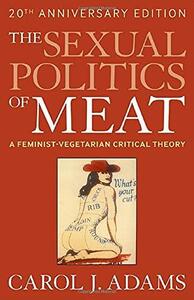Take a photo of a barcode or cover
194 reviews for:
The Sexual Politics of Meat (20th Anniversary Edition): A Feminist-Vegetarian Critical Theory
Carol J. Adams
194 reviews for:
The Sexual Politics of Meat (20th Anniversary Edition): A Feminist-Vegetarian Critical Theory
Carol J. Adams
I really appreciate the baseline concept of this book. However, most of the book tried to make its point through literally analysis, mostly literally works that are over 100 years old. I found that to be a very ineffective strategy of making a point that has a lot of power, and was hoping for more exploration that was contemporary and directly relevant (like the analysis of ads that happens in a relatively much shorter part of the book)
challenging
informative
inspiring
challenging
informative
reflective
slow-paced
The Sexual Politics of Meat claims to be a feminist-vegetarian critical theory. The fact that it's only focused on the white cishet female experience, and its constant flaws on topics such as LGBT rights make me think otherwise.
The use of transphobic obsolete terms such as "gynocentrism" and "phallocentrism" used as synonims for matriarchy and patriarchy, her definition of homophobia and its repetitive bi erasure, together with the constant connection between genitalia and gender reflect the lack of criticism in this book.
It really made me feel awful when reading about Marian, a woman who's vegetarianism catalysed her education into feminism and her evolution to lesbianism. A couple of pages later, it says that she went back to meat eating and dating men. Later on, when the author's making a point, she uses Marian's example on how she "returns to eating meat once she is able to think in the first-person singular". This statement implies that Marian also goes back to dating men after thinking in the first-person singular. I wasn't expecting the toxic discourse which says that bisexual women are traitors to feminism when they don't choose political lesbianism.
I understand this book was written in 1990, but I can't understand how it's still used as a reference today. In my opinion, a critical theory dealing with the intersection between feminism and vegetarianism musn't ignore other intersections, such as race, disability and gender outside the cishet norm.
The use of transphobic obsolete terms such as "gynocentrism" and "phallocentrism" used as synonims for matriarchy and patriarchy, her definition of homophobia and its repetitive bi erasure, together with the constant connection between genitalia and gender reflect the lack of criticism in this book.
It really made me feel awful when reading about Marian, a woman who's vegetarianism catalysed her education into feminism and her evolution to lesbianism. A couple of pages later, it says that she went back to meat eating and dating men. Later on, when the author's making a point, she uses Marian's example on how she "returns to eating meat once she is able to think in the first-person singular". This statement implies that Marian also goes back to dating men after thinking in the first-person singular. I wasn't expecting the toxic discourse which says that bisexual women are traitors to feminism when they don't choose political lesbianism.
I understand this book was written in 1990, but I can't understand how it's still used as a reference today. In my opinion, a critical theory dealing with the intersection between feminism and vegetarianism musn't ignore other intersections, such as race, disability and gender outside the cishet norm.
challenging
informative
reflective
tense
slow-paced
Adams' concept of the "absent referent", or an image that separates the meat eater from the killing of an animal in their consumption, is incredibly astute. How many of us would cease to eat meat, or limit our intake, if we personally conducted the slaughter? The absent referent also separates the exploitation of animals to the exploitation of women. Everyday we see the connection between the oppression of women to the oppression of animals, from domestic violence/animal cruelty, to physical objectification, to the actual farming of human feminized bodies and their reproductive abilities.
Sometimes Adams' analogies feel incomplete in their evidence or completely miss the mark. One particular example is how a vegan feminist would invoke violence against animals regarding dismemberment of her text, like how a Black feminist writer would invoke the lynching of her work. I get the intended analogy, but this misses the mark on the brutal image lynching holds in American history.
Despite my critiques, I still think The Sexual Politics of Meat is a necessary text in the eco-feminist canon. Adams acknowledges intersectional erased eco-feminist history, and provides a path forward.
Sometimes Adams' analogies feel incomplete in their evidence or completely miss the mark. One particular example is how a vegan feminist would invoke violence against animals regarding dismemberment of her text, like how a Black feminist writer would invoke the lynching of her work. I get the intended analogy, but this misses the mark on the brutal image lynching holds in American history.
Despite my critiques, I still think The Sexual Politics of Meat is a necessary text in the eco-feminist canon. Adams acknowledges intersectional erased eco-feminist history, and provides a path forward.
Graphic: Animal cruelty, Sexism
Still relevant today. You'd be amazed by how often women are referred to as meat in pop culture. Quite disconcerting.
interesting ideas but not necessarily compelling/persuasive to someone who doesn't already subscribe to some vegetarian lines of reasoning. kind of made me want to try vegetarianism not really for the reasons outlined in the book but really just to see what all the fuss is about...
Interesting theories, but pretty hard to get through in some areas. Her discussion of the connecting 'absent referent' in the consumption of meat/women is the strongest argument in the book.
Finally finishing this book feels like a major accomplishment - because of the weight of the content, of course, but also because it reads with the impersonal coldness of a textbook. After over a month of slogging through this one, I'm definitely proud of myself for getting through it but disappointed that I can't imagine ever recommending it to anyone in my personal life who would ever be willing to attempt to tackle this beast for more than 30 pages.
The content of the book is technically spot-on and makes several great points and connections between those points, I'll give it that much. But personal enjoyment was limited only to the more recent additions of the prefaces and epilogue which gave me more of what I enjoy most in non-fiction: personal anecdotes and a bit of humor all written up in a more conversational tone that was easy to digest without having to backtrack and reread every paragraph three times each.
The content of the book is technically spot-on and makes several great points and connections between those points, I'll give it that much. But personal enjoyment was limited only to the more recent additions of the prefaces and epilogue which gave me more of what I enjoy most in non-fiction: personal anecdotes and a bit of humor all written up in a more conversational tone that was easy to digest without having to backtrack and reread every paragraph three times each.
informative
inspiring
medium-paced





